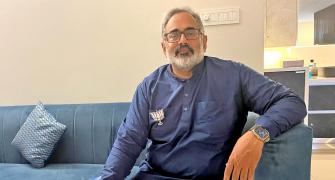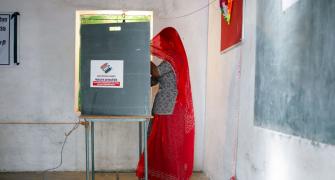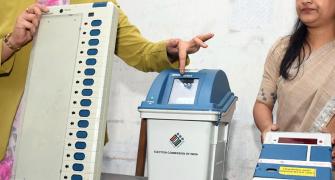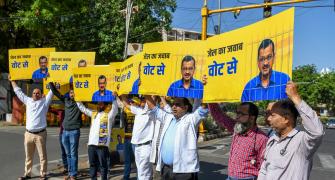Nandan Nilekani, erstwhile CEO and a founder of Infosys Technologies Limited, who is currently co-chairman of its board of directors, offered a peek into his forthcoming book Imagining India, which he said attempts to alleviate a gap in understanding India, while delivering the kick-off Global Leader Lecture at Johns Hopkins University's School of Advanced International Studies.
Nilekani, who is quoted extensively in New York Times' three-time Pulitzer Prize winning journalist Tom Friedman's best-selling book The World is Flat, said people were often perplexed by India because "of its contradictions -- a country which has stark differences, stark disparities -- and I decided to look at it from a point of view of ideas," in explaining India's explosive growth.
He said that six things had "changed in the mindset of India, which is really responsible for the growth that you see today in India -- the dynamism, the vitality, the energy."
Nilekani, who became one of the youngest entrepreneurs to join 20 global leaders on the prestigious World Economic forum Foundation Board and was listed as one of the 100 most influential people in the world by Time magazine in 2006, said the number one change in the mindset of India was with regard to population."
"Earlier, population was looked as a burden and a lot of things that happened in the 1960s and 1970s like family planning and sterilisation and the emergency and so forth, were all related to the belief that population was getting out of control and that it was actually a problem to have a large population," he said.
"Today, the language has changed dramatically, and we no longer talk about population as a burden, but we think of population as human capital. And, this has become even more critical because India is going to be the only young country in an aging world and that really makes a huge difference," Nilekani argued.
Nilekani, who was adjudged Forbes 'Businessman of the Year" in 2007, and the previous year was conferred the Padma Bhushan -- one of India's highest civilian honours -- said, India, in the next 20-30 years, would "have the largest pool of young people in the world even as the rest of the world is aging."
He described this as "a demographic dividend" that could contribute immensely to the economy "not only because they can contribute internally to the domestic economy, but they can also contribute to the global economy as when they go and work outside or they can contribute through outsourcing as is being done in our industry."
"Thus, human capital has become the core and the essence of what is happening in India and is at the root of India's resurgence today," he said.
Nilekani also said another significant change of mindset was regarding entrepreneurs who are no longer viewed with suspicion, but as icons of economic growth.
He noted that since 1991, "when there has been a huge expansion of enterprise, there is a far bigger role for the private sector and for industry, and today, India has the largest pool of entrepreneurial talent outside the United States."
"Entrepreneurship in India is blossoming and Indian entrepreneurs are not afraid of liberalisation anymore and are very confident and globally competitive and they are not only investing abroad, they are buying companies abroad and India, has the highest foreign direct investment of any developing country of Indian companies buying companies abroad," he said.
Nilekani also said, "English is also no longer viewed as an imperial language that has to be jettisoned but as a language of aspiration that has to be really cultivated."
He argued that "all the political angst about English" in the past has disappeared largely "because of the growth in the economy, because of the growth in outsourcing, because of the growth in jobs, and today English is seen as a language of aspirations."
"More and more people, whether they are in villages, small towns, are all realising that if they really want to participate in the global economy, and they really want to bring more income to their lives, they have to learn English," he said.
"And, the political system has accepted this because more and more states -- which had stopped teaching English -- are now going back to teaching English from Class one," Nilekani added.
Nilekani also argued that the whole notion of democracy had also undergone a major transformation from the time of India's independence. "In the 1950s and 1960s, it was really a top-down idea. It was an idea of the leaders who had a certain vision of the kind of country they wanted to create, and it was given or gifted to all the people who may not have necessarily understood the value and import of what was happening."
But, today, he said, "It has gone to become a bottom-up democracy where everybody understands their democratic rights -- not just in the sense of parliamentary democracy or standing for elections -- and you see a whole host of movement of people taking charge and doing things in India without waiting for the state to do the job. For example, non-governmental organisations. Today, India, is the most thriving place in the world for NGOs."
Talking of technology, another development that had catapulted India and helped it leap-frog several decades, Nilekani said, "What people don't realise is it has played as much a role in India's internal development as it has in terms of the $50 billion in information technology exports."
"For example, India's entire national election was held on electoral voting machines. You are talking about a million voting machines all over the country and the entire national elections of 2004 across the length and breadth of the country were done digitally using electronic voting machines -- there was no paper," he added.
Nilekani said, "Tthis is a classic case of how you use technology to leapfrog and go from a very antiquated system to a very modern system."
He also cited the example of the stock-market and said that in the 1990s, "India had among the most antiquated stock-markets in the world. It took months to settle transactions, there was a lot of fraud, lots of duplicate work, a lot of embezzlement and so forth. Today, thanks to technology, India has the most modern stock-markets in the world and it is completely electronic."
Nilekani said a veritable no-brainer vis-à-vis the technology revolution that had propelled India was the mobile phone.
"It has become accessible to everybody. It is touching and feeling every individual and we are seeing more and more applications, which have a huge impact and the good thing about these applications is that they cause a quantum leap in productivity -- it goes up by a huge amount and much of this is what has fueled the economic growth," Nilekani said.
Finally, he said India had adopted a progressive view of globalisation although acknowledging, "Even though there is still a lot of critics and opposition to globalisation, fundamentally the confidence that India has gained has made our world view on globalisation become far more positive."
"Our companies have become globally competitive and are willing to go out and global factors are really playing in India's favor today. More and more people are beginning to become far more comfortable with globalisation and they are realising the benefits of an open economy. They are realising the benefits of having their workers and their people all over the world, and they are realising the benefits of Indian companies exporting capital abroad," Nilekani said.







